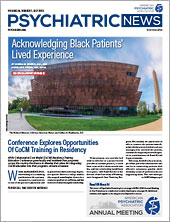When Jonathan Shepherd, M.D., introduced Danielle Hairston, M.D., during the Solomon Carter Fuller Award Lecture at APA’s 2023 Annual Meeting, he said she embodies the spirit of the late Rep. John Lewis. “Which means she likes to get into good trouble, necessary trouble,” said Shepherd, who is president of the Black Mental Health Alliance.
Hairston is this year’s recipient of the Solomon Carter Fuller Award, which was established in 1969 and recognizes a Black citizen who has pioneered in an area that has significantly improved the quality of life for Black people. Hairston is a consultation-liaison psychiatrist, the director of psychiatry residency training at the Howard University School of Medicine, and the president of the APA Caucus of Black Psychiatrists.
Hairston began her lecture by reflecting on APA’s 2016 meeting in Atlanta, when she and other attendees were still grappling with the killing of Trayvon Martin in 2012 and Michael Brown in 2014. During a visit to the Atlanta Human and Civil Rights Museum, she was struck by a quote from Martin Luther King Jr.: “No, no, we are not satisfied, and we will not be satisfied until justice rolls down like water and righteousness like a mighty stream.”
“That’s something I have been trying to embody since I became a leader in APA,” Hairston said of the quote. “I hope you all appreciate that and will take on some good trouble as well.”
Hairston spoke about vicarious racism, which refers to secondary exposure to racial discrimination through close contacts, such as family members and peers. But that definition has been increasingly challenged, she said. She asked her audience to consider: “Is this something that can be experienced by watching videos and having frequent exposure to media that feature police killings and violence toward Black people?”
During the session, A.T. McWilliams, a writer who was formerly a program lead at Google, spoke about his experience with mental illness. McWilliams struggled to get the correct diagnosis for his bipolar disorder. Though he met with a psychiatrist and described, in detail, the symptoms that he was experiencing that he now knows are associated with bipolar disorder, the psychiatrist told him he had depression and prescribed Lexapro. “I remember it was a very short response [from the psychiatrist], given my outpour,” he said. Lexapro catalyzed every possible symptom of his mania.
When George Floyd and Breonna Taylor were killed, McWilliams wrote about what he observed among the Black community. “[F]or me, and [B]lack people across the United States, every tweet, headline, and image sharing news of Floyd’s murder builds into a daily deluge of trauma—flooding our psyche, leaving us afraid to drown,” he
wrote in a June 2020
Slate article. The pain he experiences when he is racially profiled or when he learns of another example of police brutality against Black people is “a symptom of [B]lack people’s shared posttraumatic stress disorder—a uniquely American epidemic, 400 years in the making.” He described “the unjust spread” of a stress disorder among Black Americans as they are repeatedly forced to endure secondary traumas after witnessing the traumas of others.
McWilliams explained during the session that, while he was writing about this issue, he was also experiencing it. He did not realize the impact Lexapro was having on him until, eventually, he could not get out of bed. He was experiencing delusions and paranoia about police, and he did not leave his house for weeks at a time. Eventually, he learned from his own research that he had been misdiagnosed with depression. What hurt the most, he said, was that the symptoms he described to his psychiatrist at his first appointment exactly matched the description of bipolar disorder. Further, he had explained the significant impact that watching videos of police brutality, which he had to do for his job as a writer, was having on him. Yet nothing he said registered with the psychiatrist as anything other than a depression diagnosis.
Hairston
referenced a 2018
Lancet study in which the authors reported on a survey of over 100,000 Black respondents and found that about 49% had been exposed to one or more police killings of unarmed Black Americans in their state of residence in the three prior months. Each additional police killing was associated with 0.14 additional poor mental health days among the respondents. Mental health impacts were not observed among White respondents. Hairston hypothesized that, if the study were conducted again in 2023, the number of Black respondents who were exposed to a police killing of an unarmed Black American would be much higher than 49%.
She drew attention to the DSM-5 definition of posttraumatic stress disorder, which excludes exposure to potentially traumatic experiences through electronic media, television, movies, or pictures unless this exposure is work related. Yet during the question-and-answer session, attendees brought up personal experiences in which they, their loved ones, and their communities were significantly impacted by examples of police brutality, including the killing of George Floyd.
“We have to think about the strict exclusionary criteria [of the PTSD diagnosis],” she said. “Can you say that people aren’t impacted because they didn’t see [the event] themselves? We see all the downstream effects. That’s why I’m asking you all to hold APA accountable.” ■

